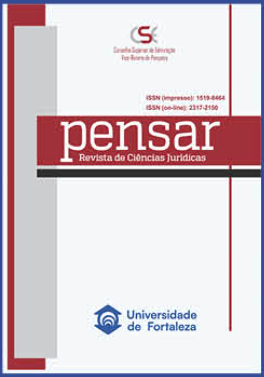Os “hooligans” brasileiros e algumas práticas antidemocráticas atuais
DOI:
https://doi.org/10.5020/2317-2150.2024.14996Palavras-chave:
atos antidemocráticos, estado democrático de direito, inquérito n. 4.781/DF, neoliberalismo econômicoResumo
O artigo analisa algumas das práticas antidemocráticas brasileiras contemporâneas notadamente no espaço temporal de 2018 até 2022. Tem-se por objetivo central diagnosticar um dos principais equívocos que ainda ressoa no imaginário social brasileiro: que nesse período o ocupante temporário do Executivo federal jogava dentro das “quatro linhas da constituição”. Para compreender essa fábula desenvolvem-se (i) a teoria da ignorância racional (Brennan, 2016), que fornece as bases teóricas para as análises; (ii) o argumento de que o neoliberalismo econômico possui uma faceta incompatível com o Estado democrático de direito, embora apresente um “verniz democrático”; (iii) um exemplo concreto sobre os limites da democracia no enfrentamento das práticas antidemocráticas no inquérito n. 4.781/DF, ainda em tramitação no Supremo Tribunal Federal (STF). Para tanto, utiliza-se a pesquisa teórica documental conjugada com a técnica de revisão sistemática de literatura para fundamentar a absoluta incompatibilidade entre certas ideias e práticas com o Estado democrático de direito. Um dos resultados encontrados pelo artigo permite afirmar que o neoliberalismo econômico possui parcela significativa de responsabilidade sobre as práticas antidemocráticas jogadas dentro das “quatro linhas da constituição”. Em conclusão, sustenta-se que o mencionado inquérito oferece respostas institucionais necessárias, porém, insuficientes para superar essa fábula que ainda paira no tempo presente.
Downloads
Downloads
Publicado
Edição
Seção
Licença
Copyright (c) 2024 Wagner Vinícius de Oliveira

Este trabalho está licenciado sob uma licença Creative Commons Attribution-NonCommercial 4.0 International License.
Este é um artigo publicado em acesso aberto sob a licença Creative Commons Atribuição 4.0 Internacional (CC-BY 4.0), que permite uso, distribuição e reprodução em qualquer meio, desde que o trabalho original seja devidamente citado.
Para mais informações, consulte: https://creativecommons.org/licenses/by/4.0/

















